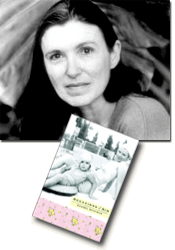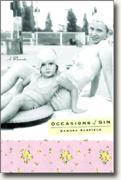In contrast to your mother, your father chose to withdraw from the family. How did this lack of involvement impact your definition of yourself? Did it affect your perception of men, in general?
It was devastating, although I didnít see it just then. I thought a manóa father figure, mind youócould love me right up to one day and then not care anymore. Not want to know if I was well or sick. I still canít believe heís never even seen a photograph of my beautiful daughter. He doesnít know my wonderful husband. So I guess I always thought men would act like that, and I tried to get out first. It was sheer blind luck that landed me with a kind stable smart funny man who never leaves the house without telling me when he will be back. He says he fell in love with me because I told stories.
The majority of your educational years, through early adolescence, were spent in convent school. How did this lifestyle reinforce your sense of isolation?
I donít think it did. I think of those school years as safe haven. I wish I could have gone to Catholic College, though; Iím sure it would have saved me a lot of later misery and I might have actually learned something. But Daddyís new wife didnít see the point of it.
In terms of difficulty, how did living away from home affect your ability to deal with your motherís chronic illness? Was it more or less difficult?
I know Mother thought it was better for me to be with the sisters, to get a good education, but I wish I had been with her every moment. I couldnít give her any comfort. I had no intimacy in my life. When I went home in the summers I had to learn to be there. Children are too often underestimated and left out of painful things.
Obviously, the premature loss of a mother brings up issues of abandonment. Did you have any tools to deal with this kind of trauma? Or does this fall into the category ďnavigating through chaosĒ?
You got it. Although I donít think my motherís death was so much an abandonment thing for me (like it was for my poor angry sister) as it was bafflement: what do I do now? Who am I? Who were you? Itís the loss of opportunity to sort out your sexual identity while you still have a role model. Nobodyís fault, but it happens when you lose a parent, all too often.
Your memoir ends at a particular point of the story, when you are a young woman. My question, then, is: how have you survived your early significant traumas to become a successful woman?
I stumbled along until I had a daughter. I took one look at heróI was almost 30óand I said, hey, if Iím not the grown up here, who is going to take care of
her? And that more or less did it. I put her first. I got better jobs. I went back to school. I married a good person. I worked hard. And finally got to start writing, which means I spend my time weighing life and searching for meaning. Iím lucky, thereís no question; the second half of my life has been very fine.
As I mentioned in my review, I see Occasions of Sin: A Memoir as Part One of your life. Will there be a Part Two?
Iím working on a novel but I do plan a second memoir about my 20ís, which took place in the 60ís, that probably gives you the drift. My best friend, Mary, recently gave me a terrific thingóall my letters to her from that time, dozens and dozens of single spaced long, long typed letters. Everything damned thing going on in my life and in my head. Iím calling the memoir ďOh Baby Oh.Ē I donít know if Iíll be sympathetic in it but the reader might have some fun looking back with me.
Have your childhood difficulties made you a stronger/better person?
I donít know. Iím who I am because of them, and I wouldnít have somebody elseís hangups.
How much has Texas, the landscape of your youth, dominated your imagination when writing?
All the time, eyes open or shut, there's an emptiness and a sadness, that imbues my sensibility. I know that others find that same landscape beautiful. I had an uncle who couldn't bear to be away from it; he thought other places crowded the sky too much! But to me it's like saying, you'll never see anything else. It's yearning.
Do you think visualizing the open plains and vast Texas sky has allowed you to open your mind in ways that might not have been possible, if you were surrounded by lush and complicated beauty?
The funny thing is, I am surrounded by beautyógorgeous foothills, the dusting of snow in winter, colors in warm weather, behind me a mountain. But when I sit down to write, itís west Texas, what can I say? Youíve got your sensibility early. Iím sure I was shaped by inexhaustible desire.
Itís one thing to interview a novelist, but a memoir is so personal that some of my questions feel intrusive and a little uncomfortable for me. How has this dialog, the memoir, been a different one with your readers? Or has it?
Itís too soon to know. Talking about it seems natural. The really hard work is behind me, and the big melancholy was all at the beginning. Though there are parts of the memoir Iíll never revisit. I wonít even reread them. And Iím through thinking about Daddy.
You do a number of workshops with writers, one of which is ďDeep Story: Writing the MemoirĒ. Thank you for that generosity. How does your personal experience enable you to help aspiring writers?
I love story! I love letting writers know that their stories matter and they can tell them. I think itís the combination of my enthusiasm and practicality that makes my workshops work. I do them in summer, so itís a kind of vacation. I make a lot of friends.
You are a prolific writer. Does this vision of yourself fit comfortably for the future?
Itís my life. Though Iíve decided to start setting some time aside to paint, too.
Do you have any specific projects planned next?
Iím just completing the manuscript of a book for apprentice writers, Scene Sense and Structure. My summer students urged me to get it down. Itís comprehensive, itís friendly. Then Iím going to get back to a novel Iíve been thinking about for years, set in a seaside Mexico village being overrun by government sponsored tourism. And then, ďOh Baby Oh!Ē
Have you any comforting words of wisdom for aspiring writers?
Nothing comes fast or easy. Everything is about discovery. You have to think of writing as day labor; you show up. You work. At night, you study. Only you donít get a paycheck, you get insight and story. And if you donít get them the hard way, they wonít be worth very much. If you do, they are grace.


